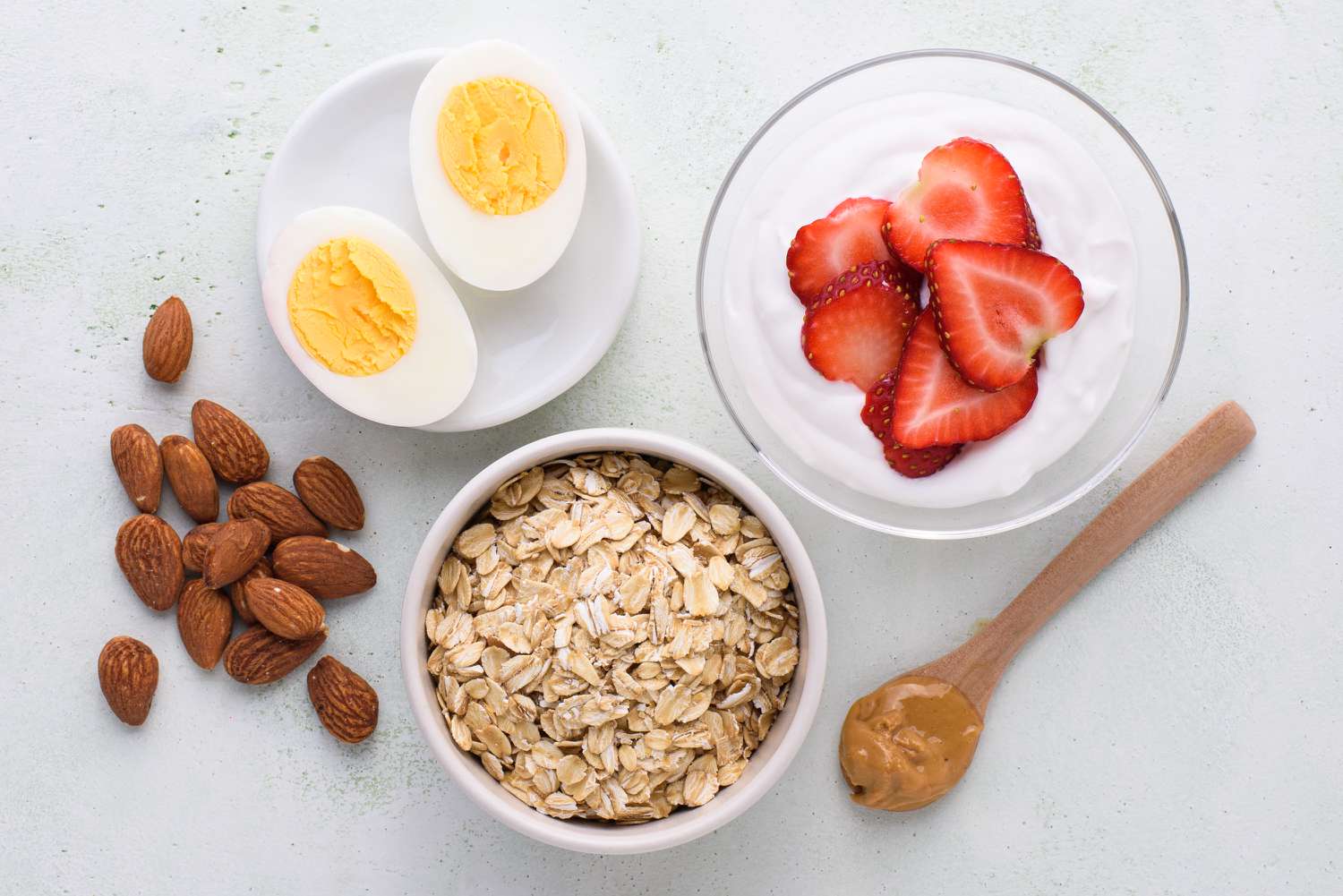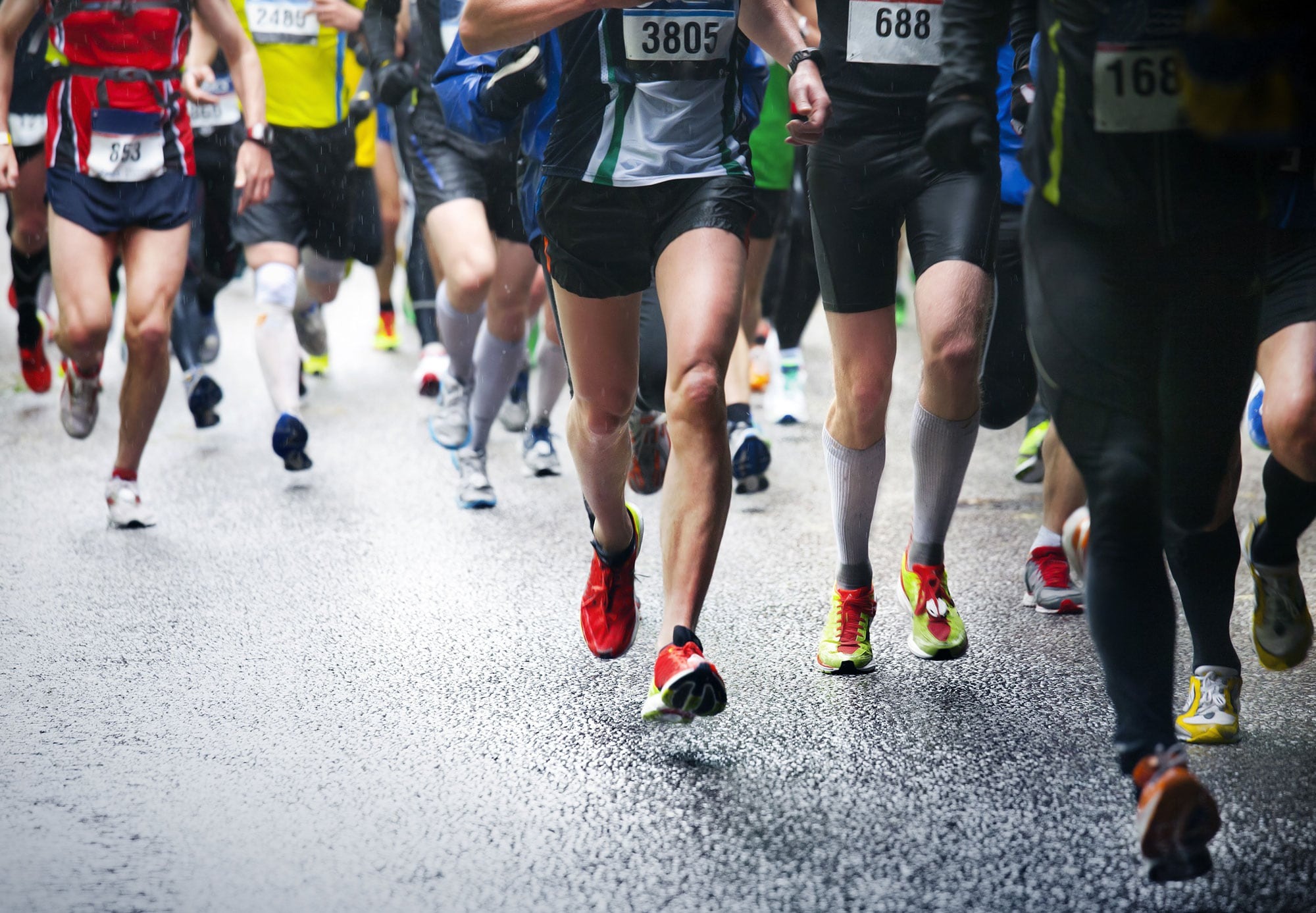

Featured
What Should I Eat Before Jogging
Modified: January 2, 2024
Looking for a pre-jogging meal idea? Check out our featured article on what you should eat before going for a run.
Introduction
When it comes to maintaining a healthy lifestyle, regular exercise is key. And what better way to get moving than with a refreshing jogging session? Whether you’re a seasoned runner or just starting out, fueling your body properly before a jog is essential for optimal performance and overall well-being.
Pre-workout nutrition plays a vital role in providing the necessary energy and nutrients to fuel your muscles, enhance endurance, and prevent fatigue during exercise. It’s like putting high-quality fuel in your car before embarking on a long journey; you want to provide your body with the right nutrients to power through your workout and achieve your fitness goals.
In this article, we will explore the importance of pre-workout nutrition specifically for jogging, along with general guidelines for pre-jogging meals. We will also discuss the best foods to eat before jogging, provide snack ideas for quick bursts of energy, and emphasize the significance of hydration. By the end, you will have a clear understanding of how to properly fuel your body before hitting the pavement.
Before we dive into the specifics, it’s important to note that everyone is different, and what works for one person may not work for another. It’s essential to listen to your body and experiment with different foods and timing to find what works best for you. Now, let’s explore the importance of pre-workout nutrition for jogging and how you can optimize your meals to maximize your performance and enjoy your runs to the fullest.
Importance of Pre-Workout Nutrition
Pre-workout nutrition plays a crucial role in optimizing athletic performance and providing the necessary fuel for your body during exercise. When it comes to jogging, fueling up before your workout can make a significant difference in your energy levels, endurance, and overall performance.
First and foremost, consuming the right nutrients before jogging helps provide your body with the energy it needs to power through your workout. Carbohydrates, in particular, are the primary source of energy for your muscles. Consuming complex carbohydrates such as whole grains, fruits, and vegetables before jogging can provide a steady release of energy and help sustain you throughout your run.
In addition to carbohydrates, including a moderate amount of protein in your pre-workout meal can be beneficial. Protein helps repair and rebuild muscle tissues, which can aid in recovery and prevent muscle breakdown. Good sources of pre-workout protein include lean meats, eggs, Greek yogurt, and plant-based options like tofu and lentils. Including a small amount of healthy fats, such as avocado or nuts, can also provide sustained energy during your jog.
Another benefit of pre-workout nutrition is preventing fatigue and maintaining endurance. When you consume carbohydrates before exercising, it helps maintain glycogen stores in your muscles. Glycogen is a form of stored carbohydrates that your muscles use for energy during exercise. By replenishing these glycogen stores before jogging, you can delay fatigue and potentially improve your endurance.
Moreover, pre-workout nutrition can help enhance focus and concentration during your jog. Certain foods, such as those rich in omega-3 fatty acids (like fatty fish or chia seeds), can support brain health and cognitive function. By fueling your brain with the right nutrients, you may find yourself more mentally alert and able to stay focused on your form and pace throughout your run.
It’s also important to consider the timing of your pre-workout meal. Eating too close to your jog can lead to discomfort, as your body will be working to digest the food while you’re exercising. On the other hand, exercising on an empty stomach may leave you feeling weak or fatigued. It’s generally recommended to eat a balanced meal containing carbohydrates, protein, and healthy fats about 1-2 hours before jogging to give your body enough time to digest and absorb the nutrients.
To conclude, pre-workout nutrition is essential for maximizing your energy levels, endurance, and overall performance while jogging. Fueling your body with the right combination of carbohydrates, protein, and healthy fats can provide sustained energy, prevent fatigue, and enhance focus during your run. Experiment with different foods and timing to find what works best for you, and remember to listen to your body’s cues. By optimizing your pre-workout nutrition, you’ll be ready to hit the pavement with vigor and enjoy the countless benefits that come with regular jogging.
General Guidelines for Pre-Jogging Meals
When it comes to planning your pre-jogging meals, there are some general guidelines to keep in mind to ensure you’re fueling your body properly. These guidelines can help optimize your energy levels, digestion, and overall performance during your run.
First and foremost, it’s important to focus on consuming a balanced meal that includes carbohydrates, protein, and healthy fats. Carbohydrates will provide you with the energy you need, while protein aids in muscle repair and recovery. Healthy fats help sustain energy levels and promote satiety.
Choose complex carbohydrates that are rich in fiber, as they provide a slower release of energy. Whole grains, fruits, and vegetables are excellent sources of complex carbohydrates. Avoid simple carbohydrates and sugary foods, as they can cause a spike in blood sugar levels followed by a crash, leaving you feeling lethargic during your jog.
Including a moderate amount of protein in your pre-jogging meal is crucial. Lean meats such as chicken or turkey, dairy products like Greek yogurt, and plant-based sources like tofu or lentils are all good options. Aim for about 20-30 grams of protein, depending on your individual needs.
When it comes to healthy fats, incorporate sources such as avocados, nuts, seeds, or olive oil. These fats provide sustained energy and can help you feel satisfied during your jog.
Hydration is also vital before a run. Be sure to drink enough water to stay hydrated, as proper hydration can help prevent muscle cramps and keep your energy levels up.
It’s important to note that every individual is different, and it may take some trial and error to find the pre-jogging meal that works best for you. Pay attention to how different foods make you feel and experiment with different combinations to see what gives you the most energy, while also considering any dietary preferences or restrictions you may have.
Lastly, consider the timing of your meal. As mentioned earlier, it’s recommended to eat a balanced meal containing carbohydrates, protein, and healthy fats about 1-2 hours before jogging to allow for proper digestion. This timeframe allows enough time for your body to absorb the nutrients and avoid any discomfort during exercise.
By following these general guidelines, you’ll be on your way to fueling your body properly before your jog and optimizing your performance. Remember to listen to your body’s cues and make adjustments as necessary. With the right pre-jogging meal, you’ll be ready to hit the ground running!
Best Foods to Eat Before Jogging
Choosing the right foods before a jog can make a significant difference in your energy levels, endurance, and overall performance. Here are some of the best foods to include in your pre-jogging meal:
- Oatmeal: A bowl of oatmeal topped with fruits and nuts is an excellent choice for sustained energy. Oats are a complex carbohydrate that releases energy gradually, while the addition of fruits and nuts provides essential nutrients and healthy fats.
- Bananas: Bananas are loaded with easily digestible carbohydrates and potassium, which can help prevent muscle cramps. They are a convenient and quick snack to fuel up before your jog.
- Greek yogurt: Greek yogurt is an excellent source of protein and calcium. Pair it with some berries and a drizzle of honey for added energy and flavor.
- Whole grain toast: Whole grain toast is rich in complex carbohydrates and fiber. Top it with avocado, a sprinkle of salt, and some cherry tomatoes for a satisfying pre-jogging snack.
- Quinoa: Quinoa is a complete protein and provides a good amount of carbohydrates. It is also rich in fiber and various vitamins and minerals. Incorporate quinoa into a pre-run salad or use it as a base for a grain bowl.
- Smoothies: Smoothies can be a great way to pack in essential nutrients. Blend fruits, vegetables, Greek yogurt, and a scoop of protein powder for a refreshing and nourishing pre-jogging drink.
- Chicken breast: Chicken breast is a lean source of protein that can aid in muscle repair and recovery. Enjoy it alongside some roasted vegetables and brown rice for a balanced pre-jogging meal.
- Whole fruit: Fruits like apples, oranges, or berries are not only hydrating but also provide a natural source of sugars for quick energy. They are portable and easy to consume on the go.
Remember to choose foods that are easy on your stomach and sit well with you personally. It’s also important to consider portion sizes to avoid discomfort during your run. Experiment with different food combinations and find what works best for your body.
A well-fueled body before a jog will lead to improved performance and overall enjoyment of your run. By including these best foods in your pre-jogging meals, you’ll be providing your body with the necessary nutrients to optimize your energy levels and tackle your workouts with vigor.
Foods to Avoid Before Jogging
While certain foods can enhance your performance and provide sustained energy during a jog, there are some foods you should avoid consuming before hitting the pavement. These foods may cause discomfort, sluggishness, or even digestive issues, hindering your performance. Here are some foods to steer clear of before jogging:
- High-Fat Foods: Foods that are high in fat, such as fatty meats, fried foods, or heavy sauces, can take longer to digest and may leave you feeling sluggish during your run. They can also cause gastrointestinal distress, leading to discomfort. It’s best to avoid these types of foods before jogging.
- Spicy Foods: Spicy foods can sometimes cause acid reflux or heartburn, which can be uncomfortable during exercise. Avoid foods that are particularly spicy or known to trigger digestive issues.
- Greasy or Heavy Foods: Greasy or heavy foods, like fast food, can weigh you down and make you feel lethargic. These types of foods can be harder to digest and may lead to gastrointestinal discomfort, making your jog less enjoyable.
- High-Fiber Foods: While fiber is generally great for your overall health, consuming too much of it before a jog can cause gastrointestinal distress. Foods like beans, broccoli, or bran cereals are high in fiber and can cause bloating or gas, so it’s best to avoid them right before your run.
- Carbonated Drinks: Carbonated beverages, such as soda or sparkling water, can cause gas and bloating, which may make your jog uncomfortable. Stick to hydrating with plain water or sports drinks instead.
- Sugary Foods and Drinks: Foods high in added sugars, like candies, sugary cereals, or sugary drinks, can cause a spike in blood sugar levels, followed by a crash. This can leave you feeling fatigued and low on energy during your jog. Opt for healthier, natural sources of carbohydrates instead.
It’s important to listen to your body and identify which foods may negatively affect your performance or cause gastrointestinal issues. Each person’s sensitivity to different foods is unique, so pay attention to how certain foods make you feel and adjust your pre-jogging meal accordingly.
By avoiding these foods that can hinder your performance, you’ll be able to have a more enjoyable and productive jogging session, with less discomfort and gastrointestinal disturbances along the way.
Pre-Jogging Snack Ideas
If you’re short on time or prefer a lighter option before your jog, pre-jogging snacks can provide a quick burst of energy to fuel your run. Here are some snack ideas that are easy to prepare and can give you the boost you need:
- Trail mix: Create your own trail mix by combining nuts, dried fruits, and a sprinkle of dark chocolate chips. This mix provides a good balance of carbohydrates, healthy fats, and a touch of sweetness for energy.
- Rice cakes: Rice cakes are a light and easily digestible snack option. Top them with a spread of almond butter or hummus for a touch of protein and flavor.
- Energy bars: Look for energy bars made with natural ingredients and minimal added sugars. Choose a bar that offers a good balance of carbohydrates, protein, and healthy fats to provide sustained energy.
- Yogurt Parfait: Layer Greek yogurt with fruits, nuts, and a drizzle of honey or maple syrup for a delicious and protein-packed snack. Greek yogurt provides a good amount of protein while the fruits and nuts offer a variety of nutrients and some healthy fats.
- Smoothie: Blend up a quick smoothie using a combination of fruits, spinach or kale, Greek yogurt, and a touch of honey or your preferred natural sweetener. This snack is hydrating, nutrient-rich, and easy to digest.
- Apple slices with nut butter: Slice up an apple and pair it with a serving of your favorite nut butter. Apples offer natural sugars for quick energy, while the nut butter provides some protein and healthy fats to sustain you during your jog.
- Hard-boiled eggs: Hard-boiled eggs are an excellent source of protein and essential nutrients. They are portable and convenient, making them a great option for a pre-jogging snack.
- Whole grain crackers with avocado: Choose whole grain crackers and top them with sliced avocado for a nutritious and satisfying snack. Avocado offers healthy fats and fiber, while the crackers provide carbohydrates for energy.
Remember to choose snacks that are easy on your stomach and sit well with you personally. It’s also important to consider portion sizes and avoid overeating before your jog. Experiment with different snack options to find what works best for you and gives you the energy boost you need without causing discomfort.
Pre-jogging snacks can be a great way to fuel your body for a run, providing the necessary nutrients and energy to enhance your performance and keep you going strong. Incorporate these snack ideas into your routine and enjoy the benefits of a well-fueled body during your jogs.
Hydration Before Jogging
Proper hydration is crucial for optimal performance and overall well-being, not just during exercise but also before you start your jog. Staying hydrated before a run can help prevent dehydration, muscle cramps, and fatigue, allowing you to perform at your best. Here are important considerations for staying adequately hydrated before your jog:
Start hydrating well in advance of your run. Drinking water throughout the day leading up to your jog helps ensure that your body is adequately hydrated. Aim to consume about 8-10 glasses (64-80 ounces) of water spread out over the course of the day.
Hydration is not just about water; it’s also about electrolytes. Electrolytes, such as sodium, potassium, and magnesium, play a crucial role in fluid balance and muscle function. Consuming foods and beverages that contain electrolytes, like sports drinks or coconut water, can help replenish these vital minerals before your jog.
It’s important to note that excessive fluid intake immediately before jogging can lead to discomfort or having to interrupt your run for bathroom breaks. Instead, focus on gradually hydrating throughout the day leading up to your jog.
Pay attention to your urine color. It’s a reliable indicator of your hydration level. Ideally, your urine should be pale yellow or clear. Darker urine suggests dehydration, while excessively clear urine may indicate overhydration.
If you find it challenging to stay adequately hydrated, consider carrying a water bottle during your jog or planning your route near water fountains. Taking small sips of water during your jog can help maintain hydration without overloading your stomach.
Every individual’s hydration needs may vary, depending on factors such as body size, fitness level, and environmental conditions. It’s essential to listen to your body’s thirst cues and drink to satisfy that thirst. Pay attention to the signals your body gives you, such as dry mouth, fatigue, or dizziness, and adjust your hydration routine accordingly.
Remember that hydration is a continuous process, and one pre-jogging drink or meal may not be sufficient. The goal is to maintain consistent hydration throughout the day and establish a habit of staying hydrated in your daily life.
By prioritizing hydration before your jog, you’ll be supporting your body’s performance, preventing dehydration, and ensuring an enjoyable and successful run. Make it a habit to hydrate properly before every jog and reap the benefits of a well-hydrated body.
Timing of Pre-Jogging Meals
The timing of your pre-jogging meal is crucial to ensure proper digestion, maximize energy levels, and prevent any discomfort during your run. The ideal timing will vary from person to person, but here are some general guidelines to consider:
Aim to eat a balanced meal containing carbohydrates, protein, and healthy fats about 1-2 hours before your jog. This timeframe allows your body enough time to digest and absorb the nutrients, providing you with sustained energy during your run.
Eating too close to your jog, especially a large or heavy meal, may cause discomfort and even cramping. Your body needs time to break down and absorb the food, and exercising too soon after eating can divert blood flow to your muscles instead of your digestive system.
On the other hand, exercising on an empty stomach can also lead to decreased energy levels and potentially impair your performance. If you choose to exercise in a fasted state, it’s important to ensure you have enough energy stores from the previous day’s meals to sustain your run.
For those who prefer morning jogs, it can be challenging to eat a full meal an hour or two before heading out the door. In this case, opt for a lighter snack, such as a banana with a spoonful of nut butter or a small bowl of overnight oats, about 30 minutes to an hour before your run.
If you’re not able to consume a full meal or snack before your run due to time constraints or personal preferences, it’s still important to ensure you’re adequately fueled. Make sure you have some energy reserves by consuming a balanced meal the night before and hydrating well throughout the day.
Keep in mind that everyone’s digestive system works differently. Experimentation is key to finding the right timing that works best for you. Pay attention to how different timing affects your energy levels, digestion, and overall performance during your runs.
Lastly, it’s worth mentioning that your pre-jogging meal timing may also depend on the duration and intensity of your run. For shorter, low-intensity runs, you may be able to allow a shorter gap between your meal and the jog. However, for longer or more intense runs, giving your body ample time to digest and fuel up is crucial.
By considering the timing of your pre-jogging meals and snacks, you can optimize your energy levels, digestion, and overall performance. Listen to your body’s cues and experiment with different timing options to find what works best for you. With the right timing, you’ll be able to fuel your runs effectively and enjoy your jogging sessions to the fullest.
Conclusion
Proper nutrition and hydration before jogging are essential for fueling your body, optimizing performance, and ensuring an enjoyable and productive run. By following the guidelines outlined in this article, you can make informed choices about your pre-jogging meals and snacks to enhance energy levels, endurance, and overall well-being.
Remember to prioritize a balanced meal that includes carbohydrates, protein, and healthy fats. Complex carbohydrates provide sustained energy, protein aids in muscle repair and recovery, and healthy fats provide additional energy and satiety. Choose foods that are easy on your stomach and sit well with you personally.
Hydration should not be overlooked, both throughout the day leading up to your jog and immediately before your run. Staying properly hydrated helps prevent dehydration, muscle cramps, and fatigue. Listen to your body’s thirst cues and aim to drink enough water and electrolytes to maintain optimal hydration levels.
Consider the timing of your pre-jogging meals and snacks, allowing enough time for digestion and absorption of nutrients. Eating too close to your jog may cause discomfort, while exercising on an empty stomach can lead to decreased energy levels. Finding the right timing that works for you may require some experimentation.
Lastly, it’s important to note that each individual is unique, and what works for one person may not work for another. Pay attention to your body’s cues, experiment with different foods and timing, and adjust based on your personal preferences and needs.
By incorporating these principles into your pre-jogging routine, you’ll be well-equipped with the knowledge and strategies to fuel your body for success on your runs. Whether you’re a casual jogger or a seasoned runner, optimizing your nutrition and hydration before jogging can make a significant difference in your performance, endurance, and enjoyment of the activity.
So lace up your running shoes, grab a nutritious pre-jogging meal or snack, and hit the pavement with confidence, knowing that you’re fueling your body in the best possible way for a successful and satisfying jog.









